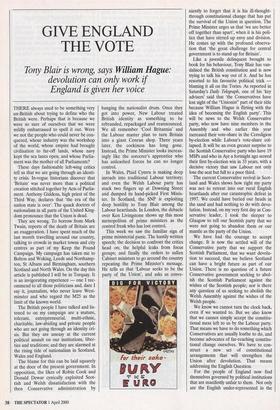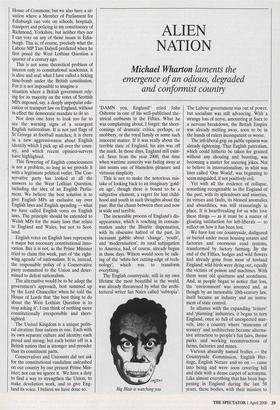GIVE ENGLAND THE VOTE
Tony Blair is wrong, says William Hague:
devolution can only work if England is given her voice
THERE always used to be something very un-British about trying to define who the British were. Perhaps that is because we were so sure of ourselves that we were mildly embarrassed to spell it out. Were we not the people who could never be con- quered, whose industry was the workshop of the world, whose empire had brought civilisation to far-off lands, whose navy kept the sea lanes open, and whose Parlia- ment was the mother of all Parliaments?
These days fashionable left-wing critics tell us that we are going through an identi- ty crisis. In-vogue historians discover that `Britain' was never more than a political creation stitched together by Acts of Parlia- ment. Anthony Giddens, high priest of the Third Way, declares that 'the era of the nation state is over'. The quack doctors of nationalism in all parts of the United King- dom pronounce that the Union is dead.
They are wrong. To borrow from Mark Twain, reports of the death of Britain are an exaggeration. I have spent much of the last month travelling around our country, talking to crowds in market towns and city centres as part of my Keep the Pound Campaign. My campaign has taken me to Bolton and Woking, Leeds and Northamp- ton, St Albans and Birmingham, southern Scotland and North Wales. On the day this article is published I will be in Torquay. It is an invigorating experience — one I rec- ommend to all those politicians and, dare I say it, journalists, who never leave West- minster and who regard the M25 as the limit of the known world.
The British people I have talked and lis- tened to on my campaign are a mature, tolerant, entrepreneurial, multi-ethnic, charitable, law-abiding and private people who are not going through an identity cri- sis. But they are uneasy at the current political assault on our institutions, liber- ties and traditions; and they are alarmed at the rising tide of nationalism in Scotland, Wales and England.
The blame for this can be laid squarely at the door of the present government. In opposition, the likes of Robin Cook and Donald Dewar cynically exploited Scot- tish and Welsh dissatisfaction with the then Conservative administration by banging the nationalist drum. Once they got into power, New Labour treated British identity as something to be rebranded, repackaged and reannounced. We all remember 'Cool Britannia' and the Labour master plan to turn Britain into a giant Conran shop. Three years later, the cockiness has long gone. Instead, the Prime Minister looks increas- ingly like the sorcerer's apprentice who has unleashed forces he can no longer control.
In Wales, Plaid Cymru is making deep inroads into traditional Labour territory; and even the Welsh Labour party has stuck two fingers up at Downing Street and dumped its hand-picked First Minis- ter. In Scotland, the SNP is exploiting deep hostility to Tony Blair among the Labour heartlands. In London, the debacle over Ken Livingstone shows up this most metropolitan of prime ministers as the control freak who has lost control.
This week we saw the familiar sign of prime ministerial panic. The hastily written speech; the decision to confront the critics head on; the helpful leaks from focus groups; and finally the orders to sullen Cabinet ministers to go around the country repeating the Prime Minister's message. He tells us that 'Labour seeks to be the party of the Union', and asks us conve- niently to forget that it is his ill-thought- through constitutional change that has put the survival of the Union in question. The Prime Minister urges us that 'we are better off together than apart', when it is his poli- tics that have stirred up envy and division. He comes up with the profound observa- tion that 'the great challenge for central government is to stand up for Britain'.
Like a juvenile delinquent brought to book for his behaviour, Tony Blair has van- dalised the British constitution and is now trying to talk his way out of it. And he has resorted to his favourite political trick blaming it all on the Tories. As reported in Saturday's Daily Telegraph, one of his 'key advisers' said that 'the Conservatives have lost sight of the "Unionist" part of their title because William Hague is flirting with the idea of becoming the English party'. This will be news to the Welsh Conservative party, who now have nine members in the Assembly and who earlier this year increased their vote-share in the Ceredigion by-election while Labour's vote-share col- lapsed. It will be an even greater surprise to the Scottish Conservative party who have 19 MSPs and who in Ayr a fortnight ago scored their first by-election win in 33 years, with a decisive victory that saw Labour not only lose the seat but fall to a poor third, The current Conservative revival in Scot- land and Wales shows how right my party was not to retreat into our rural English heartlands after our catastrophic defeat in 1997. We could have buried our heads in the sand and had nothing to do with devo- lution. Instead, on my very first day as Con- servative leader, I took the sleeper to Glasgow to tell our Scottish party that we were not going to abandon them or our mantle as the party of the Union.
We have had the courage to accept change. It is now the settled will of the Conservative party that we support the Scottish Parliament, that we want devolu- tion to succeed, that we believe Scotland can have a bright future as part of our Union. There is no question of a future Conservative government seeking to abol- ish the Scottish Parliament against the wishes of the Scottish people; nor is there any question of us seeking to abolish the Welsh Assembly against the wishes of the Welsh people.
We know we cannot turn the clock back, even if we wanted to. But we also know that we cannot simply accept the constitu- tional mess left to us by the Labour party. That means we have to do something which Conservatives are usually loathe to do, and become advocates of far-reaching constitu- tional change ourselves. We have to con- struct a new set of constitutional arrangements that will strengthen the Union after devolution. That means addressing the English Question.
For the people of England now find themselves governed by political institutions that are manifestly unfair to them, Not only are the English under-represented in the House of Commons; but we also have a sit- uation where a Member of Parliament for Edinburgh can vote on schools, hospitals, transport and policing in my constituency of Richmond, Yorkshire, but neither they nor I can vote on any of those issues in Edin- burgh. This is, of course, precisely what the Labour MP Tam Dalyell predicted when he first posed the West Lothian Question a quarter of a century ago.
This is not some theoretical problem of interest only to constitutional academics, it is alive and real: what I have called a ticking time-bomb under the British constitution. For it is not impossible to imagine a situation where a British government rely- ing for its majority on the votes of Scottish MPs imposed, say, a deeply unpopular edu- cation or transport law on England, without in effect the democratic mandate to do so.
Nor does one have to look too far to see the warning signs of a resurgent English nationalism. It is not just flags of St George at football matches; it is there in a new aggressiveness about English identity which I pick up all over the coun- try, and which recent opinion-surveys have highlighted.
This flowering of English consciousness is not a problem, so long as we provide it with a legitimate political outlet. The Con- servative party has looked at all the answers to the West Lothian Question, including the idea of an English Parlia- ment. We believe the best solution is to give English MPs an exclusive say over English laws and English spending — what we have called English votes on English laws. The principle should be extended to Welsh MPs for the many laws that relate to England and Wales, but not to Scot- land.
English votes on English laws represents a major but necessary constitutional inno- vation. But it is not, as the Prime Minister tried to claim this week, part of 'the right- wing agenda' of nationalism. It is, instead, the responsible policy of a Conservative party committed to the Union and deter- mined to defeat nationalism.
The alternative would be to be adopt the government's approach, best summed up by the Lord Chancellor when he told the House of Lords that 'the best thing to do about the West Lothian Question is to stop asking it'. I can think of nothing more constitutionally irresponsible and short- sighted.
The United Kingdom is a unique politi- cal creation: four nations in one. Each with its own separate culture and identity; each proud and strong; but each better off in a British nation that is stronger and prouder than its constituent parts.
Conservatives and Unionists did not ask for the constitutional vandalism unleashed on our country by our present Prime Min- ister; nor can we ignore it. We have a duty to find a way to strengthen the Union, to make devolution work, and to give Eng- land its voice. I believe we have done so.























































































 Previous page
Previous page